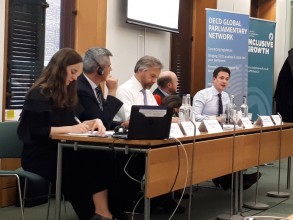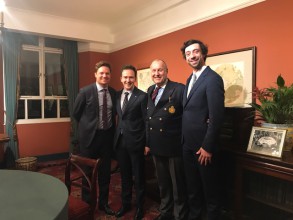 Nieuws uit Brussel
12.04.2018
Nieuws uit Brussel
12.04.2018
Internationale OESO-conferentie in Londen
Vorige week vond in Londen een internationale conferentie plaats van de OESO (Organisatie voor Economische Samenwerking en Ontwikkeling) waarop parlementaire delegaties uit de 35 lidstaten werden uitgenodigd. Namens het Vlaams Parlement werden Willem-Frederik Schiltz (Open Vld) en ikzelf afgevaardigd. De focus van de conferentie lag op het dusdanig organiseren van steden en gemeenten dat alle leefgemeenschappen betrokken worden.
De OESO is een organisatie waar sociaal en economisch beleid besproken, bestudeerd en gecoördineerd wordt. Net als in oktober 2016 vertegenwoordigde ik andermaal het Vlaams Parlement op één van haar conferenties, echter ditmaal in het ‘House of Commons’, het parlement van het Verenigd Koninkrijk.
Global Parliamentary Network
De OESO komt in verschillende samenstellingen samen; soms zijn het ministers van de lidstaten die over een bepaald thema samenzitten, andere keren zijn het parlementsleden uit de verschillende nationale parlementen die over bredere thema’s debatteren. Vorige week vond zo’n ‘Meeting of the OECD Global Parliamentary Network’ plaats. Beslissingen worden er niet genomen, maar het biedt wel de mogelijkheid om kennis uit te wisselen met andere parlementsleden of met de experten van de OESO.
De kijk van een burgemeester
Vanuit de OESO kwam de vraag of ik als burgemeester van Staden mijn kijk wou geven op het voeren van een inclusief beleid in onze gemeente. Bij een inclusief beleid wordt rekening gehouden met alle leefgemeenschappen, zoals autochtonen en allochtonen, jong en oud, arm en rijk,… Onder dit artikel kan je mijn speech (Engelstalig) herlezen.
Best practices
Het verwondert uiteraard niet dat alle aspecten die besproken werden, in de meeste OESO-lidstaten nog de nodige aandacht verdienen. Zo ook in Vlaanderen. Heel wat van de ideeën die er ter sprake kwamen zal ik zeker meenemen in mijn functie als burgemeester, in mijn parlementair werk en in mijn politiek engagementen in de toekomst. Als er één conclusie is die ik durf trekken na vandaag, dan is het dat er enkel vooruitgang kan worden geboekt, als democratieën openstaan voor best practices van andere landen.
Tot slot wil ik nog een woord van dank richten tot Dhr. Nic Van der Marliere, Algemeen Afgevaardigde van de Vlaamse Overheid in het Verenigd Koninkrijk voor het hartelijke ontvangst en de zeer interessante gesprekken.
SPEECH:
Dear members/representatives of the Organisation for Economic Co-operation and Development (OECD),
Dear fellow representatives of other parliamentary institutions,
As a young parliamentarian in the Flemish Parliament and Mayor of Staden – a small city in the middle of Flanders fields – it is a great honour for me to share with you all some of my ideas about what an inclusive city of the 21st century should look like. I hope it can provide inspiration for fellow policymakers in urban development, whether at local, regional or European level.
First of all, I think it is very important that we understand some of the challenges that different European cities currently face and will face in the years ahead. There is no denial of the importance of cities for our present and our future Europe. Cities play a crucial role as motors of the economy, they are fertile ground for science and technology, for culture and innovation, for individual and collective creativity, and for mitigating the impact of climate change. Cities are also places where problems such as unemployment, segregation and poverty are often concentrated. I am convinced that the development of our cities will determine the future economic, social and territorial development of the European continent.
I think the biggest challenge cities around the world face is sustainability. Cities are key to the sustainable development of their countries, but also of the European Union. So if cities fail to respond to these challenges so will countries and the European Union in the end.
When we hear sustainability, most people amongst you will rightly think about climate change. Sustainability however, can also be defined in other terms. Such as inclusion, environmental sustainability and financial sustainability.
Let us start by looking at the impact of growing population of the world on sustainability. November 2011 is therefore a date that will live in history books as the day that people worldwide for the first time were living more in cities than outside. According to the United Nations that percentage will rise till 70% in 2050. In Europe, already two thirds of the European population live today in urban areas.
Can our cities deal with this?
We see that our economies in their current form are unable to provide decent jobs for all these people. That means that some part of the population is pushed towards low-skilled and low-wage service sector jobs. In its turn this has impacted growing income disparities with in some neighbourhoods a concentration of inequalities in terms of poor housing, low-quality education, unemployment and difficulties or inabilities to access certain services. We all know this analysis by now.
What can politicians do to remedy this process? Firstly: there is no single vision of the model city. In fact there might be as many visions as there are people here present today. Many cities have developed, through more or less participative processes, their own visions of what they would like their future to look like. These visions are diverse as they build on different realities, different strengths, weaknesses, opportunities and threats, as well as different values. To develop a vision of the city of the 21st century may seem like a futile exercise. Cities must develop their own visions, engaging their inhabitants, organizations, administrations, and other local resources and stakeholders.
What we can do today is providing guiding principles how politicians can enable to embrace sustainability.
The series of challenges are – taken separately – demanding in their own right. I could easily spend one hour for every challenge and still I would not have enough time. To keep it short I feel that what cities do need is to adopt a more holistic model of sustainable urban development. An integrated holistic way can turn threats into positive challenges with inclusive growth as a result.
Cities have throughout history been divided between rich and poor areas. Our current cities are not that different. Globalisation has led to an accelerated circulation of people, identities, religions, as well as ideologies and lifestyles. Polararisation today therefore is a question not only of rich and poor, but also of cultural, social and ethnic diversity.
As politicians we need to try to turn diversity into a positive driver for innovation and attractiveness, supporting rather than undermining cohesion. This means as politicians you will sometimes have to swim against the current.
Yes, we – as politicians – can contribute to inclusive growth by combating social polarization and poverty. We should always try to leave no one behind.
That means avoiding the segregation of ethnic groups and I can bring to you a good example of my hometown. Following the refugee crisis of 2015, our Belgian Federal government decided to open temporary asylum centres where the refugees could be based. One of them was located not very far from my city. At the start I received an incredible amount of protest, which varied from letters, to racist remarks in the streets. As a local council, however, we did everything in our power to encourage the integration process of these new and possible future citizens. At the start there were here some minor incidents in the village upon which we acted quickly in order to demonstrate that safety was guaranteed in the village at all times. And after a few months the integration process proved a success. Villagers were starting to know the refugees by name and saw through their own first-hand experience that they were people, just like themselves. It sounds perhaps simplistic but all it takes sometimes is to let two people discover that they actually have many things in common: for example: reading books, watching movies, playing football, and perhaps more in the end than with some of their own neighbours.
So as a local council I do believe you can make a difference: this by promoting the participation of and cooperation with all inhabitants and taking action to de-legitimise and oppose racism and discrimination.
What is needed is positive action and spreading good examples.
Now more than ever when we look at the rise of populism in Europe and throughout the world. Actions can include mechanisms aimed at recruiting people with foreign roots to work in public services.
Another area where politicians can make a difference in order to create a sustainable city in the 21ste century is housing.
Today, in some situations, the poorest parts of the population have been left behind or put at risk of lagging because of policies designed to increase the attractiveness of cities which focus on upgrading city centres, building new-neighbourhoods, business parks or shopping centres.
Good housing conditions are, however, key to making a city and its agglomeration attractive and livable. In many cities spatial segregation processes – as an effect of social polarization – make it increasingly difficult for people with low incomes or from marginalized groups to find decent housing at affordable prices.
The differences in regulatory powers give cities very different possibilities for acting on the pressing issues on which their attractiveness and economic developments depend. Cities resources regarding urban and city planning vary greatly but governance systems can adapt in order to attempt to achieve a fine balance between eradicating poverty and deprivation and providing affordable housing and neighborhoods that can accommodate alternative lifestyles. There is a need to avoid stigmatizing deprived neighborhoods and also to understand their functional role as transitional spaces for newcomers, for young people and for other less affluent groups that cannot afford to live in a cities wealthier areas. The big focus for urban policy there is to ensure the function of transitional space, without letting neighborhoods turn into dead-end streets with no social mobility and no cohesion with the rest of the city. Good examples from other countries should therefore be shared. Communication, information sharing, providing examples is one of the most important things that can be done to promote our sustainable cities of the 21st century.
As a liberal my guiding principle throughout these policies is fundamental and crucial: freedom.
Everyone should be free to live in the city of their desire. They should be free to love in the city who they want, to find work, We always talk about the newcomers’ obligation to integrate into their new environment but we sometimes forget to ask ourselves the question: what can we do to help their integration and do we not need to integrate in our city ourselves? A newcomer to my city has equal right to call our city as his own hometown. Not even I as a mayor, have the right to say that I have more rights than these newcomers. To the contrary, we should embrace the fact that someone from a different cultural background is proud to call it his hometown and want to have his opinion heard about the city. And address head on the potential pitfalls of believing ourselves more tolerant and open than we perhaps may be. And leave ourselves the freedom to challenge our own believes about integration.
Therefore I like to end my speech with a quote of a Turkish writer, Mustafa Akyol:
Liberalism is not a way of living, it is tolerating different ways of living.
I thank you for your attention.

